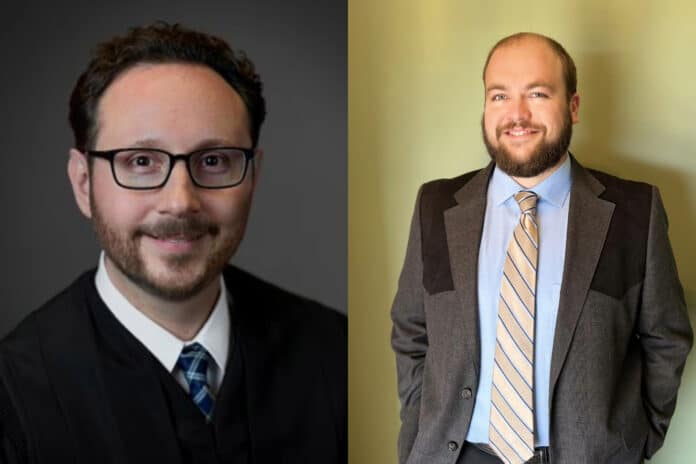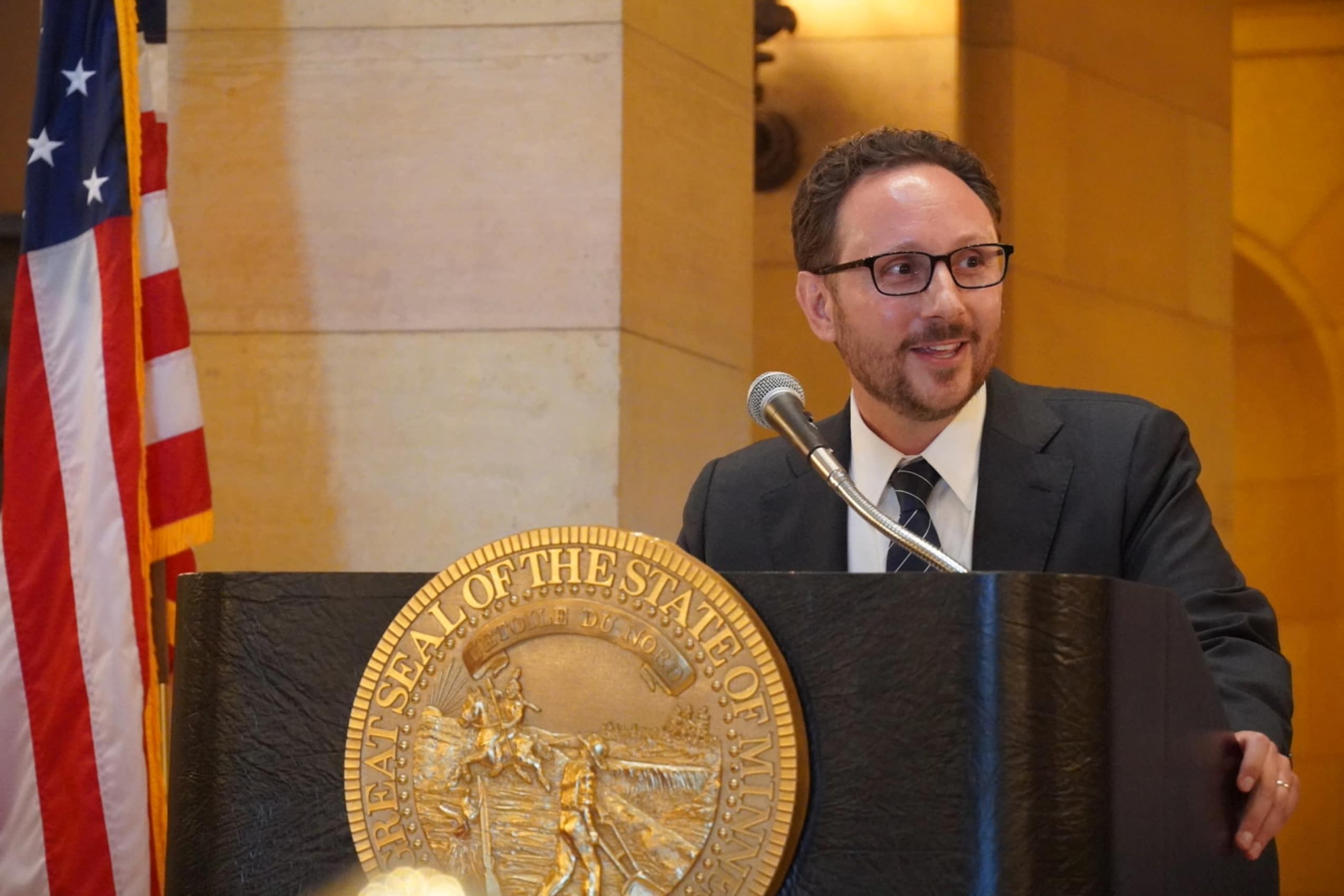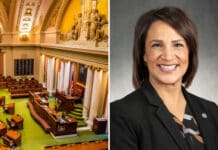
A south metro attorney who ran (but fell short of a win) for district court judge in 2022 is aiming higher this November.
Matt Hanson filed his affidavit of candidacy on Thursday to challenge former Gov. Tim Walz attorney Karl Procaccini for a seat on the Minnesota Supreme Court.
While there are three spots on the state’s highest court up for election this fall, Hanson, 32, said he opted to seek the seat occupied by Walz’s former general counsel and deputy chief of staff because of his belief that the judiciary should function independent of partisan politics. Procaccini is best known as one of Walz’s top legal advisors during the 2020 Covid-19 pandemic and riots in 2020.
“I believe [Procaccini’s past employment in the Walz administration] raises questions about the independence of the court and the impartiality required in cases where the executive branch is involved,” said Hanson, a fifth-generation Minnesotan and solo attorney who practices estate planning.
Walz appointed Procaccini to the Supreme Court last August after Chief Justice Lorie Gildea announced her retirement. He took his oath of office in October and before the end of the year had already launched a campaign website to announce he would seek a full six-year term in 2024.
To date, Procaccini has raised more than $90,000 for his campaign, with max donations coming from several recognizable DFL donors, according to campaign finance reports. Longtime DFL kingmaker and attorney Charlie Nauen serves as co-chair to Procaccini’s campaign.
A request for comment to Procaccini’s campaign wasn’t immediately returned Friday. But the Connecticut native and Harvard Law alumnus told media last fall he won’t let his 4.5 years of work advising the inner circle of the Walz administration compromise his independence on the court.
He also said during that same press conference that he was proud of the work he and other members of Walz’s general counsel and executive team accomplished in crafting executive orders for the governor during the pandemic and riots of 2020.
“A mentor once told me, when a judge raises their right hand and takes that oath of office, they are swearing their loyalty to the people of Minnesota, the Constitution of Minnesota, the laws of Minnesota,” Procaccini told reporters last August.
Hanson isn’t convinced. Which is why he’s running.
“Our Constitution specifically provides for judicial elections as an important check on the judiciary to ensure it remains independent and non-partisan,” said Hanson, a Prior Lake native who lives in Credit River with his wife. They are expecting their first child this September.
“Gov. Walz appointing his former lawyer and deputy chief of staff to the Supreme Court raises questions about the independence of the judiciary and the impartiality of the appointee in cases involving the governor or the executive branch,” he added.
Hanson’s challenge to Procaccini comes at a time when the DFL has a monopoly over all seven seats on the Minnesota Supreme Court. After the retirement of Justice G. Barry Anderson in May, all seven sitting justices have been appointed by either former Gov. Mark Dayton, or Walz, both Democrats. Anderson and Gildea were both appointed by former Republican Gov. Tim Pawlenty.
Lessons learned from 2022 judicial campaign
While Hanson does not yet have a campaign website up and running, he announced his candidacy on X (formerly known as Twitter) on Friday morning.
Hanson, whose father is a retired attorney and former professor at Concordia University in St. Paul, believes his Minnesota roots will prove an asset as he reaches out to voters this summer and fall. But he acknowledges Procaccini’s connections inside Democrat circles will be formidable.

In 2022 Hanson was the only candidate in Minnesota who challenged an incumbent for one of Minnesota’s 105 judicial district seats. He lost that First Judicial District race by 10 points to Judge Charles Webber. But in the process, Hanson said that of the 114,212 votes he earned, he was able to engage in many important conversations with voters.
“I was blown away by the support and interest voters have in ensuring the judiciary is free from partisan influence,” Hanson said, recalling his campaign experience two years ago. “There is a demand among voters to not only elect their judges, but to ask them questions, hear from them outside the courtroom, and be able to maintain trust in their judicial system.”
Procaccini ties to Walz, DFL, scrutinized
When Walz announced he would appoint his former inner circle advisor and legal counsel to the Supreme Court last August, the news was met with criticism by political opponents.
“With the departure of Justice Gildea, Walz had an opportunity to select a pragmatic voice and ensure Minnesotans have a diverse set of views on the Minnesota Supreme Court,” House Minority Leader Lisa Demuth, R-Cold Spring, said at the time. “Instead, he picked the chief architect of the 2020 lockdowns and mandates that destroyed businesses and kept our kids out of the classroom with zero judicial experience to serve on the state’s highest court.“
Procaccini openly considers himself a political progressive, and has been an active member of the American Constitution Society, a left-leaning legal organization founded in 2001 by legal counsel for former Democratic presidential candidate Al Gore.
Hanson, who doesn’t shy away from expressing his political opinions on social media, said that he will probably not seek a party endorsement, as he believes partisan politics don’t belong on the state’s highest court.
“I believe running in the election is a reasonable way to support the Constitution and the rights of the people of Minnesota to elect their judges,” he said. “I have no current nor former allegiance to the governor, only to the people and the laws of Minnesota.”
While serious challengers to incumbent members of the Minnesota Supreme Court aren’t a given, in 2014, attorney Michelle MacDonald came within 7 percent of the vote against sitting Justice David Lillehaug.
Hank Long
Hank Long is a journalism and communications professional whose writing career includes coverage of the Minnesota legislature, city and county governments and the commercial real estate industry. Hank received his undergraduate degree at the University of Minnesota, where he studied journalism, and his law degree at the University of St. Thomas. The Minnesota native lives in the Twin Cities with his wife and four children. His dream is to be around when the Vikings win the Super Bowl.















